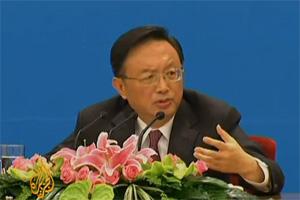What China is Prepared To Do in Syria
Chinese Foreign Minister Yang Jiechi in Damascus (Al-Jazeera video)
A Chinese envoy headed to Syria on Tuesday, after China called for an immediate cease-fire and talks by all parties in Syria.
Time was when China didn’t get much involved in international affairs, beyond funding various Southeast Asian Communist insurgency groups in the 1960s and ’70s.
Now, as a growing world power, China does weigh in. In the case of Syria, it has used its weight to block international intervention that would oust President Bashar al-Assad.
In a news conference on Tuesday, Chinese Foreign Minister Yang Jiechi was asked about China’s position on Syria.
His response?
“On the issue of Syria, as you know, not long ago, a leading official of the Chinese Ministry of Foreign Affairs made a statement on this issue. He set out a six-point proposition and proposal on handling resolving the issue of Syria.”
This was a curiously coy answer, given that Yang is the most senior official in the Foreign Ministry. Indeed, even the original Foreign Ministry statement on Sunday, with the six-point proposal, didn’t name the so-called “leading official” in the Foreign Ministry. What it did was call for all parties to cease all acts of violence, and resolve their differences through dialogue.
The Chinese envoy went to Syria to try to promote such dialogue. But he’s expected to talk only to the government side.
China has long been friendly with that government — selling it arms, doing oil deals, and exporting a couple billion dollars worth of Chinese goods each year. It has reason to want Assad’s government to stay.
Many Syrians have reason to want it to go. Refugees fleeing the city of Homs have told stories of atrocities by government troops. One woman told the BBC that her family witnessed a massacre of 36 men and boys from one village. She said her own son’s throat was cut; he was 12.
By now, an estimated 7,000 Syrians are believed to have been killed since the start of the uprising about a year ago. Senator John McCain said on Monday that he thinks it’s time for the United States to step in.
“The United States should lead an international effort to protect key population centers in Syria, especially in the north, through air strikes on Assad’s forces,” McCain said. “To be clear, this will require the United States to repress enemy air defenses in at least part of the country.”
The White House has said that President Obama doesn’t agree that this is the best way forward.
Still, McCain’s proposal sounds a lot like the action that the United States took part in in Libya last year.
China’s leaders didn’t like the precedent set in Libya — that a people could rise up against their government, and a UN Security Council resolution could be stretched to allow foreign air strikes to support them against that government. The Chinese Foreign Ministry’s statement Sunday said: “We oppose anyone interfering in Syria’s internal affairs under the pretext of ‘humanitarian issues.'”
And yet, when Premier Wen Jiabao opened this week’s National People’s Congress — China’s 10-day annual exercise in guided democracy — he painted China as a champion of global peace.
“We will work tirelessly with other countries to advance human civilization, improve the well-being of people in all countries, and build a harmonious world of enduring peace and common prosperity,” Wen said.
And also, it appears, of enduring authoritarian governments, regardless of how much their populations want them gone. It’s only ironic that a Party that came to power leading a popular revolt against an authoritarian government— is taking that stand.
